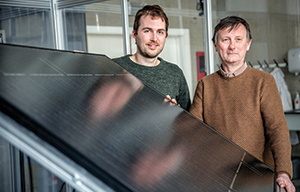Scientists invent hydrogen-producing solar panels
 Prof. Johan Martens (left) and his team of bioengineers, including Tom Bosserez (right), invented a solar panel that produces hydrogen. |
Belgian scientists have invented a solar panel that produces hydrogen as a source of fuel to heat homes, according to www.inhabitat.com. The solar panels use moisture in the atmosphere to convert sunlight into hydrogen gas, which is stored in an oil tank near the building.
A team of scientists led by Johan Martens at Katholieke Universiteit Leuven in Leuven, Belgium, has been developing the hydrogen solar panel for 10 years. At first, the solar panels only could produce small quantities of hydrogen gas, but now hydrogen gas bubbles appear as soon as a panel is exposed to direct sunlight.
"It's actually a unique combination of physics and chemistry," Martens says. "Over an entire year, the panel produces an average of 250 liters per day, which is a world record."
Martens estimates 20 solar panels could provide enough energy and electricity to heat a home and have some to spare for the following year.
Although the team is not yet ready to build the panels for commercial use, it is preparing for a trial run at a home in Flanders, Belgium. If the tests are successful, the scientists plan to expand their trials to an entire neighborhood.
Hydrogen is a combustible gas and can be dangerous if not handled correctly. The scientists say hydrogen carries the same risks as natural gas.
The technology is viewed as promising with the potential to produce zero carbon emissions. However, there is uncertainty regarding costs related to the solar panels, storage tanks, furnace and installation. It is possible the upfront cost would be high, but homeowners could pay off the system over time if they no longer relied on city electricity or natural gas.



